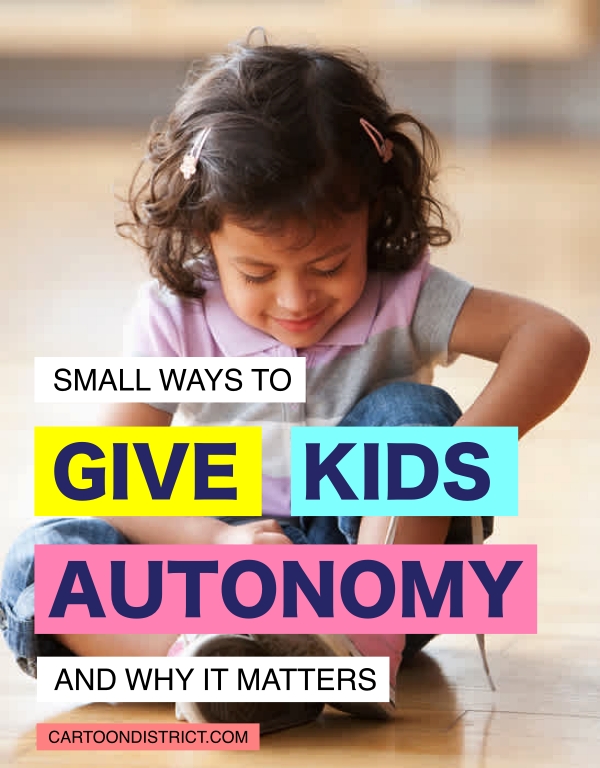When it comes to promoting autonomy in children, small acts and changes can make a big difference. But, you might wonder, what exactly does that mean? Why is autonomy so valuable?

Overview
First, let’s cover the basics. The definition of autonomy is “self-directing freedom and especially moral independence” or “a self-governing state” according to the Merriam-Webster dictionary. In other words, to have autonomy is the ability to make your own choices and perceptions.
Why Does Autonomy Matter?
Although it’s true that kids can’t make all of their own decisions just yet, it’s important that they develop autonomy and confidence in that autonomy. For older children, a higher level of autonomy will typically be appropriate than what is the case for young children. With age, a person should generally show the ability to self-direct, form their own perspective, and make their own decisions. That said, it’s powerful to instill a certain level of autonomy in kids at a young age. Benefits of doing so include but are not limited to:

Self-confidence. We all have the ability to make a difference in the world, no matter who we are. When kids know that they’re autonomous, self-directed actions and thoughts matter, they have the confidence to make a change and work toward goals.

Decision-making skills. Strengthening a child’s sense of autonomy has the potential to support critical thinking and decision-making skills because it is empowering. It doesn’t mean that decision-making will come easily to every person who had parents the emphasised autonomy but can help them tap into that part of themselves when it counts.

Trust in oneself. When you promote autonomy, you encourage your child to trust themselves and their intuition. This is a crucial lifelong skill that will help to strengthen safety. They may be able to understand whether certain situations are strange or unsafe more easily if they know that they can trust themselves.
Something that’s important to remember in any case with kids is that they grow into adults. Children internalize ideas about themselves, the capacity they have to form their own opinions, trust themselves, and so on, from a young age. These ideas stick with a person in adulthood. If someone thinks that they can’t trust themselves, it can have consequences. Remember, none of this means that you won’t help your child – it means that you’ll encourage their inner knowing.
Ways To Give Kids Autonomy

With it in mind that you will know what best suits your child based on age and other factors, here are some ways to give kids autonomy:
- Ask for their opinion. Saying, “what do you think?” to your children is a powerful act. Not only is it a way to start a conversation with your kids and connect with them emotionally, but it also shows them that their thoughts, discernment, and intelligence matter.
- Let them say “no” to hugs and other acts of physical affection. Truthfully, this one is anything but small, and it’s absolutely vital. Allowing kids to make choices about if they want to give family friends or family members hugs, kisses, and so on, teaches bodily autonomy and reinforces the idea that they are allowed to say “no.” If someone in your life protests when your child says “no,” it can be difficult. Should this happen, many parents opt to explain to the individual that they’re working to foster bodily autonomy so that the child knows they can say “no” in other future scenarios.
- Give options when possible. Giving kids options is an excellent way to support autonomy in kids of all ages, but especially younger kids. Maybe, they are not ready to fully dress themselves, but you can set out a range of clothes and let them pick from a couple of different outfits. Food and play activities are another area where you can work on giving kids choices. Perhaps, for example, you can allow them to choose from several menu items and let them decide what they want.
You know your child best. Don’t be afraid to get creative and modify these tips based on your children and their needs!
Support For Parents

Being a parent isn’t easy, especially during the time of the coronavirus pandemic. Whether you want to talk about parenting or something else that’s on your mind, seeing a mental health provider such as a therapist or counselor can help. There are a number of ways to find a mental health provider you can see. You can ask your doctor for a referral, contact your insurance company to see who they cover, utilize an employee assistance program if applicable, search the web, or use a website like Mind Diagnostics to help you find a mental health professional in your area. All you have to do is put in your zip code, and you will see a range of providers in your area. Regardless of what route you take, be proud of yourself for taking the first step and reaching out. We all need someone to talk to or sound off with from time to time, and therapy is a great way to find a non-judgmental ear.
